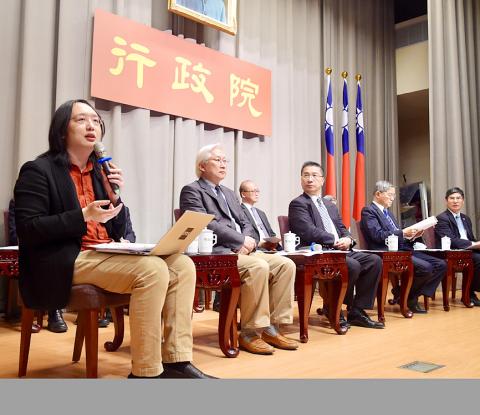The Executive Yuan yesterday announced plans to invest NT$46.056 billion (US$1.51 billion) over the next eight years to improve the nation’s digital infrastructure and bridge the rural-urban divide.
The plan — part of the government’s “Forward-looking Infrastructure Construction Project” — aims to improve rural access to broadband Internet, as well as develop a 5G mobile services network by 2020 and an Internet of Things (IoT) network.
Officials told a news conference they are aiming for 90 percent coverage of broadband services nationwide, with rural access speeds to be in the megabytes per second range.

Photo: Huang Yao-cheng, Taipei Times
The plan also calls for enhancing information security, improving a disaster-relief communications system and developing a cloud-computing system for public education.
National Development Council Minister Chen Tain-jy (陳添枝) said that government investment in the expansion of broadband Internet would spur more investment from private enterprises, which is estimated to reach NT$238 billion.
National Communications Commission spokesman Wong Po-tsung (翁柏宗) said that the country has already stepped up preparations to activate a 5G network, adding that IoT technology would be the next major development.
“In the future, truly everything will be connected to the Internet,” Wong said.
Facilitating broadband access to rural communities is essential to safeguard the right to equal access for all, especially those who live in remote areas, Wong said.
Minister Without Portfolio Audrey Tang (唐鳳) said that pervasive megabyte-speed Internet access is the trend, and rural communities cannot be left behind.
Officials said artists and other creative content producers would benefit from higher-speed broadband services, which would allow for the transmission of high-definition images and video content.
Government digital storage facilities will be upgraded to allow the storage of higher-definition content, while use of digital networks will be promoted among content producers.
The announcement described plans for promoting interest in technology by connecting schools to virtual classrooms and installing interactive systems at technology parks.
Officials said they hoped to foster interest in innovation and creative content design among students.
Minister Without Portfolio Wu Tsung-tsong (吳政忠) said that Taiwan’s communications and technology industries used to place more emphasis on hardware, but the focus is now shifting to digital design.
The government hopes to see hardware, software and content be better integrated, Wu said, adding the future would see the promotion of such things as artificial intelligence and driverless cars.
Content and application services will grow increasingly important, Wu said.
Asked about IoT, Tang compared it with the development of air pollution and earthquake monitoring systems, which have become more accurate and efficient.
In the future all of the information people need will be available at once, which will boost the deployment of these technologies, Tang said.
Deputy Minister of Education Lin Teng-chiao (林騰蛟) said that he looks forward to using a portion of the new special budget to purchase new equipment for classrooms and install fiber Internet connections in schools.

CHAOS: Iranians took to the streets playing celebratory music after reports of Khamenei’s death on Saturday, while mourners also gathered in Tehran yesterday Iranian Supreme Leader Ayatollah Ali Khamenei was killed in a major attack on Iran launched by Israel and the US, throwing the future of the Islamic republic into doubt and raising the risk of regional instability. Iranian state television and the state-run IRNA news agency announced the 86-year-old’s death early yesterday. US President Donald Trump said it gave Iranians their “greatest chance” to “take back” their country. The announcements came after a joint US and Israeli aerial bombardment that targeted Iranian military and governmental sites. Trump said the “heavy and pinpoint bombing” would continue through the week or as long

TRUST: The KMT said it respected the US’ timing and considerations, and hoped it would continue to honor its commitments to helping Taiwan bolster its defenses and deterrence US President Donald Trump is delaying a multibillion-dollar arms sale to Taiwan to ensure his visit to Beijing is successful, a New York Times report said. The weapons sales package has stalled in the US Department of State, the report said, citing US officials it did not identify. The White House has told agencies not to push forward ahead of Trump’s meeting with Chinese President Xi Jinping (習近平), it said. The two last month held a phone call to discuss trade and geopolitical flashpoints ahead of the summit. Xi raised the Taiwan issue and urged the US to handle arms sales to

BIG SPENDERS: Foreign investors bought the most Taiwan equities since 2005, signaling confidence that an AI boom would continue to benefit chipmakers Taiwan Semiconductor Manufacturing Co’s (TSMC, 台積電) market capitalization swelled to US$2 trillion for the first time following a 4.25 percent rally in its American depositary receipts (ADR) overnight, putting the world’s biggest contract chipmaker sixth on the list of the world’s biggest companies by market capitalization, just behind Amazon.com Inc. The site CompaniesMarketcap.com ranked TSMC ahead of Saudi Aramco and Meta Platforms Inc. The Taiwanese company’s ADRs on Tuesday surged to US$385.75 on the New York Stock Exchange, as strong demand for artificial intelligence (AI) applications led to chip supply constraints and boost revenue growth to record-breaking levels. Each TSMC ADR represents

State-run CPC Corp, Taiwan (CPC, 台灣中油) yesterday said that it had confirmed on Saturday night with its liquefied natural gas (LNG) and crude oil suppliers that shipments are proceeding as scheduled and that domestic supplies remain unaffected. The CPC yesterday announced the gasoline and diesel prices will rise by NT$0.2 and NT$0.4 per liter, respectively, starting Monday, citing Middle East tensions and blizzards in the eastern United States. CPC also iterated it has been reducing the proportion of crude oil imports from the Middle East and diversifying its supply sources in the past few years in response to geopolitical risks, expanding